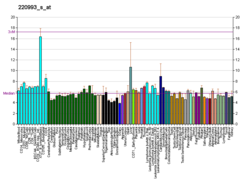
KNOWPIA
WELCOME TO KNOWPIA
Summary
Probable G-protein coupled receptor 63 is a protein that in humans is encoded by the GPR63 gene.[5]
| GPR63 | |||||||||||||||||||||||||||||||||||||||||||||||||||
|---|---|---|---|---|---|---|---|---|---|---|---|---|---|---|---|---|---|---|---|---|---|---|---|---|---|---|---|---|---|---|---|---|---|---|---|---|---|---|---|---|---|---|---|---|---|---|---|---|---|---|---|
| Identifiers | |||||||||||||||||||||||||||||||||||||||||||||||||||
| Aliases | GPR63, PSP24(beta), PSP24B, G protein-coupled receptor 63 | ||||||||||||||||||||||||||||||||||||||||||||||||||
| External IDs | OMIM: 606915 MGI: 2135884 HomoloGene: 12759 GeneCards: GPR63 | ||||||||||||||||||||||||||||||||||||||||||||||||||
| |||||||||||||||||||||||||||||||||||||||||||||||||||
| |||||||||||||||||||||||||||||||||||||||||||||||||||
| |||||||||||||||||||||||||||||||||||||||||||||||||||
| |||||||||||||||||||||||||||||||||||||||||||||||||||
| |||||||||||||||||||||||||||||||||||||||||||||||||||
| Wikidata | |||||||||||||||||||||||||||||||||||||||||||||||||||
| |||||||||||||||||||||||||||||||||||||||||||||||||||
G protein-coupled receptors (GPCRs, or GPRs) contain 7 transmembrane domains and transduce extracellular signals through heterotrimeric G proteins.[supplied by OMIM][5]
References edit
- ^ a b c GRCh38: Ensembl release 89: ENSG00000112218 – Ensembl, May 2017
- ^ a b c GRCm38: Ensembl release 89: ENSMUSG00000040372 – Ensembl, May 2017
- ^ "Human PubMed Reference:". National Center for Biotechnology Information, U.S. National Library of Medicine.
- ^ "Mouse PubMed Reference:". National Center for Biotechnology Information, U.S. National Library of Medicine.
- ^ a b "Entrez Gene: GPR63 G protein-coupled receptor 63".
Further reading edit
- Kawasawa Y, Kume K, Nakade S, et al. (2000). "Brain-specific expression of novel G-protein-coupled receptors, with homologies to Xenopus PSP24 and human GPR45". Biochem. Biophys. Res. Commun. 276 (3): 952–6. doi:10.1006/bbrc.2000.3569. PMID 11027574.
- Kawasawa Y, Kume K, Izumi T, Shimizu T (2000). "Mammalian PSP24s (alpha and beta isoforms) are not responsive to lysophosphatidic acid in mammalian expression systems". Biochem. Biophys. Res. Commun. 276 (3): 957–64. doi:10.1006/bbrc.2000.3570. PMID 11027575.
- Lee DK, George SR, Cheng R, et al. (2001). "Identification of four novel human G protein-coupled receptors expressed in the brain". Brain Res. Mol. Brain Res. 86 (1–2): 13–22. doi:10.1016/S0169-328X(00)00242-4. PMID 11165367.
- Strausberg RL, Feingold EA, Grouse LH, et al. (2003). "Generation and initial analysis of more than 15,000 full-length human and mouse cDNA sequences". Proc. Natl. Acad. Sci. U.S.A. 99 (26): 16899–903. Bibcode:2002PNAS...9916899M. doi:10.1073/pnas.242603899. PMC 139241. PMID 12477932.
- Niedernberg A, Tunaru S, Blaukat A, et al. (2004). "Sphingosine 1-phosphate and dioleoylphosphatidic acid are low affinity agonists for the orphan receptor GPR63". Cell. Signal. 15 (4): 435–46. CiteSeerX 10.1.1.486.4056. doi:10.1016/S0898-6568(02)00119-5. PMID 12618218.
- Mungall AJ, Palmer SA, Sims SK, et al. (2003). "The DNA sequence and analysis of human chromosome 6". Nature. 425 (6960): 805–11. Bibcode:2003Natur.425..805M. doi:10.1038/nature02055. PMID 14574404.
- Gerhard DS, Wagner L, Feingold EA, et al. (2004). "The status, quality, and expansion of the NIH full-length cDNA project: the Mammalian Gene Collection (MGC)". Genome Res. 14 (10B): 2121–7. doi:10.1101/gr.2596504. PMC 528928. PMID 15489334.







